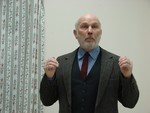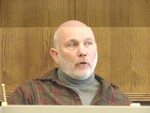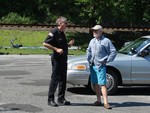|


|
|
|
Click to visit the
Official Town Site
|
|
|
|
|
|
General News: Mayor Gross Campaigns for a Second Term

|
| Mayor Gross at the mayoral debate last week. |

|
| Mayor Gross at a village board meeting earlier this year. |

|
| The mayor speaks with police chief Charles Williams at the riverfront last summer. |
March 12, 2009
As Cornwall-on-Hudson Mayor Joseph Gross campaigns for a second term in office, he can be seen frequently where he feels most comfortable -- on the streets of the village where he was born and raised, talking to residents and trying to let their concerns guide his actions as mayor.
In his office Wednesday morning he paused from the demands of his position to look back at his first term in office and speak about the many projects he has tackled around the village – from fixing up at the park at the entrance to the south end of the village to forming a committee to address parking and beautification of the village square – and the many he would still like to pursue. His main point of accomplishment, he said, was sticking to a debt reduction program that has reduced the village debt by 1.5 million dollars while not taking out any new bonds.
His many achievements, he said, came despite the very real challenges he faced working with an entrenched style of doing business that he inherited from Mayor Ed Moulton, who held office for 26 years. “When Mayor Moulton left he didn’t tell me anything, but left a pile of folders with a note in the drawer,” Mayor Gross recalled.
Sorting through the mechanics of government took time for the new mayor, whose effort to weigh all sides of an issue is part of his deliberate management style. Six months into his new administration, he welcomed the retirement of the long-time chief of the department of public works, Bob Gilmore, who, he said, was accustomed to acting without supervision. The new DPW head, Dave Halvorsen, is more open to change, according to the mayor.
He removed the village attorney, Howard Protter, who, he said, had tremendous influence in the village and needed to be replaced.
Mayor Gross believes that when he was voted into office in 2007 by a large margin, the voters were looking for change and he has tried to fulfill that mandate. That’s one of the reasons why he threw himself into the workings of all of the departments – from police to the DPW – to see how changes, small or large, could be made. He has implemented an employee evaluation process to hold people more accountable for their actions and asked for changes in the police department, like having an officer assigned to the crosswalk at the elementary school or on duty when West Point commuter traffic is coming down Route 218. “I think it is important to the community,” he said, referring to the police presence.
He rejects the accusation that he is a micro-manager, but says he believes it is his responsibility to keep tabs on what is going on. “My obligation is to make things run smoothly. I am the supervisor of all of the departments,” he explained, “that’s the definition of my office. I have repeatedly said that money is tight and we need to conserve resources.” As a result of his oversight, the water department was moved into the DPW building and the DPW mechanic was assigned to repair the fire department’s equipment, among other things.
When it comes to managing natural resources, Mayor Gross endorses the use of alternative sources of energy, like that hydro-electric proposal introduced by trustee Rick Gioia that could significantly reduce energy costs at the Black Rock filter plant.
He says he is lucky to have people like Rick Gioia and Barbara Gosda to work with on the trustee board. Both were elected in 2008 and Mayor Gross noted at the public debate last week that he was often at loggerheads with the two trustees they replaced. “They were very good people, Mayor Gross said, “but when you’ve been there too long, you are more about preserving than adapting to change.”
One of the practices that Mayor Gross put an end to was department heads carrying out projects on their own. He said he was stunned when former DPW head Bob Gilmore introduced a plan for an upgraded municipal parking lot without the prior involvement of the board. Mayor Gross stopped that project before it left the drawing board, as well as Gilmore’s plan to use FEMA money to create a seawall at the riverfront.
The mayor also says that the comprehensive master plan is “not a good document” and must be carefully reviewed. The village has had the final document more than a year and a half but he said that nobody was beating down the door to take action, except Lee Murphy, who chaired the master plan committee.
Mayor Gross elaborated on his concerns about the comprehensive plan document, saying that the quality-of-life issues addressed in it are not relevant to a master plan. He insists that quality-of-life issues should be handled by the mayor and the board of trustees and he went through a list of recommendations in the master plan that he has already addressed.
He invited in an Orange County planner who did a study of parking resources and made recommendations for re-striping spaces and sharing others with existing businesses. He has pursued getting Route 218 recognized as a historic road and asked the state to designate the village’s stone arch bridges as historic. He has eliminated dumping in Pagenstecher Park and restored the trail along Dock Hill and the old Clark Street to the riverfront. He has written to the Orange County Water Authority and U.S. Congressman John Hall to ask for money to repair water leaks, he said.
“The Duncan Avenue intersection is not a master plan issue,” the mayor noted, “the fire siren is a not an operational issue either,” he said, arguing that the village doesn’t need a master plan to address that. He said that he asked the residents of Duncan Avenue to sign a petition asking for action on the intersection that he sent to Senator Larkin and Assemblywoman Calhoun to show them what their citizens were concerned about.
Mayor Gross said that the village planning and zoning boards should be enforcing the codes that are on the books, rather than trying to apply personal preferences about how the village should look once a new set of codes based on the master plan recommendations are adopted. He cited as an example the planning board’s approval of a project on Hudson Street with a mix of commercial and residential uses that needed so many variances because it was not in line with code.
“I want to deal with the comprehensive plan in a way that is fair to everyone,” he noted, “with a commitment from the entire board.”
What Mayor Gross does believe the village needs is more volunteerism, civic involvement in preserving the village way of life. A life-long resident of Cornwall-on-Hudson, his dedication to preserving the environment and the quiet beauty of its streets and riverfront is evident when he speaks. He wants to control any development and says that he listens to the people of the village and does his best to act on their behalf.
For example, when residents of River Avenue approached the board last month about how their quality of life was impacted by traffic on the thoroughfare, the mayor promised action to enforce the speed limit. The street is due for re-paving but Mayor Gross noted this week that the improvement is a double-edged sword that could result in people driving faster. There may not be funds available to complete the project anyway, according to the mayor, who said people who drive on it may have to find an alternative way to reach Route 9W if they are unhappy with River Avenue’s bumpy surface.
The mayor has drawn criticism for some local business owners, like Deke Hazirjian, who believe he is against even small-scale commercial development. Rather than answer his critics, the mayor has on occasion tried to ignore them, skipping over their letters in a pile of correspondence that is read at board meetings or failing to include them at all.
It’s a cross-section of the residents that Mayor Gross wants to hear from and this election season Mayor Gross is back where he was two years ago, running a grassroots campaign that takes him from door-to-door asking people about their concerns. He favors face-to-face communication where he can explain his priorities: paying down the debt and finding ways to economize services that do not affect public safety and health. He’ll tell people, if they ask, that the recycling pick-up schedule was changed in response to the DPW employees who thought it would be more efficient if done twice a month. He considers himself the people’s representative and as he wrapped up an interview in his office he pointed to the big welcome mat that he installed when he first took office, a sign of a new era at village hall.
Read more about what the mayoral candidates had to say at least week's mayoral debate here.
Comments:
No comments have been posted.
Add a Comment:
Please signup or login to add a comment.
|
 |
|
|
|